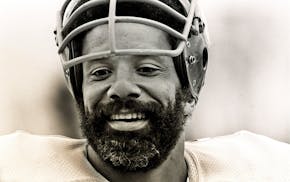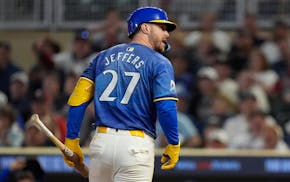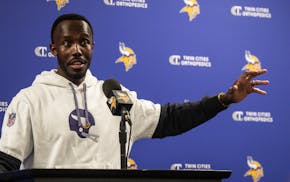Gubernatorial candidates Tim Walz and Jeff Johnson squared off Saturday for the third time in two days, this time to share their views on a range of environmental and recreational issues.
The informal debate was held during the Game Fair hunting convention on the grounds of the Armstrong Ranch Kennel in Ramsey. Dozens of people packed underneath a white tent to hear the two candidates speak.
One of the first questions asked about their stance on firearm regulations, with both Walz, the DFL pick, and Johnson, the Republican candidate, reaffirming their positions.
Walz, who grew up hunting, said basic regulations such as requiring universal background checks are reasonable changes that would help reduce gun violence. "There are compromises that can be made that protect your Second Amendment rights but still allow for improvements in safety," he said.
Johnson said he would not sign any gun restrictions into law, adding that they ignore the root cause of mass shootings. "Something has happened to some of the boys and young men in our society, and we ignore that issue when we try to go to the easy answer," he said.
When Johnson said Walz has touted an "F rating" he received from the National Rifle Association, Walz replied that "the NRA is not the arbitrator of everything we do here."
The discussion then moved into more specific topics, including copper mining, invasive species and acquisition of public lands.
Moderator Rob Drieslein asked whether the potential environmental hazards of a copper-nickel mining project proposed by Twin Metals near the Boundary Waters Canoe Area Wilderness outweigh the jobs it could bring to the region. Both candidates said that the project first needs to go through a stringent environmental review.
"We need to follow the science," Walz said. "Twin Metals is a different animal. [The project] sits in a different watershed. It has not been explored yet."
"If it puts our natural resources at risk, no, I will not support that," he added.
Johnson said the state should not add more "road blocks" and that he would support the project if it's done "in an environmentally safe way."
Moderator Ron Schara asked what they would do to address controversial catch-and-release regulations of walleye in Lake Mille Lacs.
Johnson said he would try to negotiate with the tribes that have previously disagreed with the state on the safe harvest level. "It's just truly an unfair system right now," he said.
Walz later retorted: "Have you met with Mille Lacs and their leadership in conference on this?" Johnson replied that he had not.
Both candidates said they would take an aggressive approach to fighting invasive aquatic species. They also supported the idea of forming a citizens group that would help select the commissioner for the state Department of Natural Resources.
A question from the audience asked how the two candidates felt about the mowing of roadside ditches, an issue that has generated a passionate discussion in rural Minnesota.
"This is a stickier question than fixing health care," Walz joked before responding.
Johnson said farmers should be able to do what they like with their land. "It's crazy that when I travel around greater Minnesota I hear as much about ditch mowing as I do about taxes or health care," he said.
Near the end of the debate, both candidates agreed the Legislature should not push massive omnibus bills late into the session and have to go into special sessions. Johnson said he would "veto any omnibus garbage bill" that violates the single-subject rule of the Minnesota Constitution.
The forum capped a busy week for the two candidates, who won their respective races in the primary elections Tuesday night. They met for their first one-on-one debate Friday morning in Nisswa and again for a televised debate later that day.
Saturday's debate was sponsored by the Minnesota Outdoor Heritage Alliance and the weekly publication Outdoor News.
Miguel Otárola • 612-673-4753
A $2.8 billion settlement will change college sports forever. Here's how

Reusse: Country boy Jim Marshall never lost his lust for life

Twins open homestand with loss to Blue Jays, Jeffers ejected after critical call

Vikings GM talks to the Star Tribune about the team's 2025 outlook, McCarthy's trajectory

![Candidates for governor Tim Walz and Jeff Johnson have their first debate at Grand View Lodge, Nisswa, MN. Tom Hauser of KSTP moderated the debate. ]](https://arc.stimg.co/startribunemedia/OXVPYF7MQE2DMD6Z2EVEPHYERA.jpg?w=600&h=600&auto=format%2Ccompress&cs=tinysrgb)